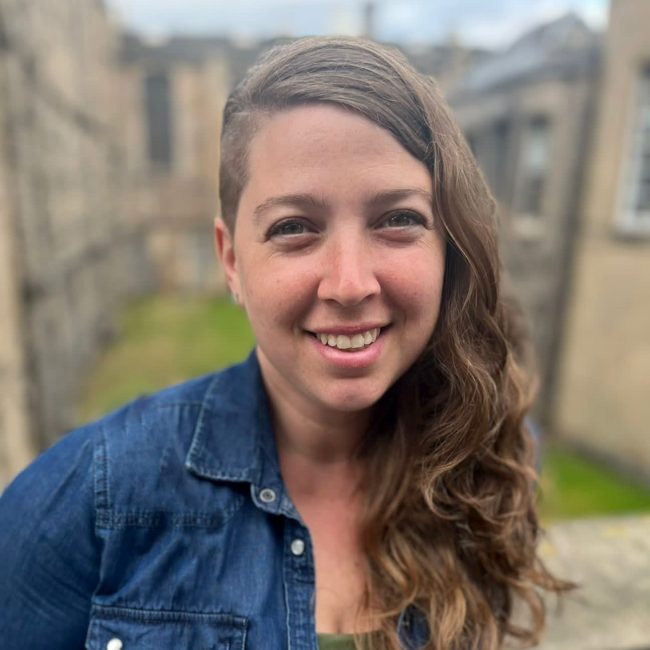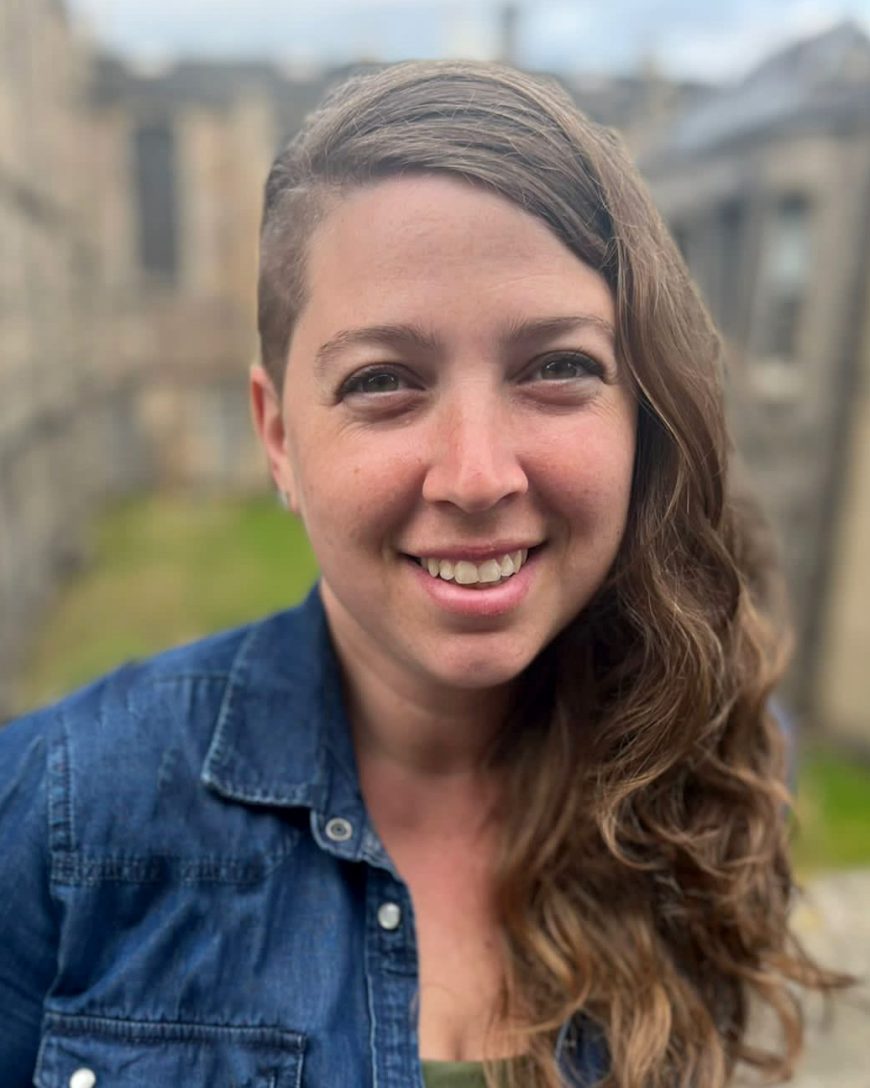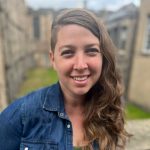Curated conversations with data science for social impact leaders on their career journeys
Pathways to Impact is a series of conversations with data for social impact leaders exploring their career journeys. Perry Hewitt, CMO of data.org, spoke with Ivana Feldfeber, Co-founder of DataGénero, about her journey from education to the field of data for social impact.
Would you share with us a bit about your start in data for social impact? What was the initial impetus?
Oddly enough, I come to this work from a background in education – I’m not an engineer or a computer scientist by training. Right after high school, I started to study biology because I wanted to get involved in environmental studies and education, but I soon learned that the biology program was more oriented to research than to applied work. That spurred my pivot to education, and I ended up with a bachelor’s degree in general education and a second degree in social work education. Throughout, I had great teachers who emphasized both critical thinking and social justice.
One of my early roles was offering gender-based violence workshops for teens and children in a school system in the Buenos Aires slums. I was fortunate to receive several scholarships for related research; for example, I conducted a study of the transgender community in Argentina in 2015. By participating in these research projects, I learned I was more passionate about direct service: using technology to help people in the underserved communities where I worked.
And here’s how my education efforts connected me to technology. I was working in a food bank, a place where people in the neighborhood could come for an evening meal when they did not have food during the day. This food bank had received a huge donation of computers, which were all locked in a room gathering dust. No one was using them because they were afraid to break them! I asked my boss for access and ended up building out a computer room for everyone. All the women who were working there, preparing food and cleaning, had limited education because of their domestic and caregiving responsibilities. They were part of a program to teach them how to read and write and basically finish elementary school. Most of them were grandmothers, mostly women in their 60s. I started to teach them how to use computers to manage photos of their grandchildren, assemble a curriculum vitae, use email, and be on the internet in a safe way. This work showed me how powerful technology literacy could be, with the potential to be life-changing for many people.
From there, things escalated: I started showing teachers how to include technology in their classrooms, and then I started to learn programming and robotics to teach in the classrooms. Today, I am the executive director of DataGénero, a gender data observatory. Based in Argentina, we are building a broader network to monitor practices and policies regarding data and gender in Latin America.
Part of the Pathways to Impact series
What particular problem are you trying to solve today?
At DataGénero, we focus on women and gender data issues – but our work is truly intersectional, looking also at racial and social justice. We want to have better data about really difficult situations for everyone, not just women, but gender is our entry point to this work.
Overall, we have three big goals.
One is to address the missing data in Latin America regarding women and the LGBTQ+ community. Today, we know that we don’t have the data required to understand the issues and to make good public policy. We’re doing awareness campaigns, and we are working with governments to collect and provide better data. In particular, we want to stop having gender data in a solely binary way. This can pose a challenge in some contexts, but luckily, we have some laws here in Argentina that are really progressive regarding gender identity.
The second goal is to capture and understand the existing use of artificial intelligence in the region for social policy and practice. We find much of this work to be problematic, so we are surveying what’s happening, and to understand what companies and governments are doing with artificial intelligence (AI) in the region. We are even applying our own technology to understand this problem — we want to create an algorithmic register to see where and how AI algorithms are being used.
Finally, we are creating datasets using AI and natural language processing (NLP) techniques to extract data from criminal court rulings in cases of gender-based violence. We are examining those rulings to dimension the problem as well as to see patterns in the judges’ decisions. Obviously, the data sets are anonymized, but there is so much we can learn about how gender-based violence occurs in our society. Was the victim dating the aggressor? Was it a family member or a stranger? What time of day, and what kind of violence? We are working on an AI to do that—of course, with the supervision of humans. We want to understand the whole picture, all the details that don’t get reported in the news. Only then, can we understand how to solve gender-based violence.
There’s a clear cost to society if these goals are not realized. There is the obvious cost to women and oppressed populations, but also significant economic impact. We do some reporting on this impact, based on data services that are made open three times a year. We analyze these, and share the results publicly. I should add that Ecofeminita in Argentina is a great group that looks more broadly at how gender data links to economic impact.
We have a broad spectrum of people and advisors that come from different fields; in this intersectional way of thinking and seeing the world, we can’t just rely on a single way of seeing things.
Ivana Feldfeber Co-founder and Executive Directress DataGénero
What were some of the unexpected blockers to your career progression? Are there challenges associated with being an executive director as a woman? How about your background in education?
More the latter: I’m always paying the price of not being an engineer or a computer scientist, and I find that really frustrating. To me, that’s not the most important thing when we are talking about social policy and practice, but I do feel judged for having a bachelor’s degree in education. I also have a postgraduate certificate in data science but I don’t have a Master’s or a PhD. I am self-taught, and I code a lot in my free time, but I am not an engineer. Without that credential, some people do have the perception, “Oh, what is she doing here?”
How have you overcome that perception for DataGénero?
We have built a strong, multidisciplinary organization, made up of people that are excellent at their field. We have engineers, mathematicians, and physicists who work with us when we’re building tools or when we are interpreting new information, and we also have people from sociology and public policy and lawyers. We have a broad spectrum of people and advisors that come from different fields; in this intersectional way of thinking and seeing the world, we can’t just rely on a single way of seeing things. As a leader, I bring both technical and non-technical perspectives to that work.
What community of people or resources bolsters your work? Is there an online community or a group of people you meet with in person?
We have been able to connect with a lot of people because we started to tackle an issue that wasn’t really discussed in our region. Now, when people think about gender data in Latin America, they think about us. We have been fortunate to build great alliances with other networks of women in data science and also with people in the global north thinking about these issues. We don’t want to import solutions, but we want to see what everyone is thinking. We are grateful for an online community of people that are supporting us and talking about us in different fields, classrooms, and events. And then we have some in-person events that we are starting to do again. But we were born during the pandemic, so at first, everything was online.
Personally, I am a part of several large communities I love. One is Open Heroines: they are great. They are global and work with data, open data, and open government. That community is a place where I can ask any kind of question and people will respond.
Another is a strong network of women in the tech field in Argentina called Las de Sistemas and Mujeres en Tecnología Córdoba.
Finally, there is the Latin American, Women in Bioinformatics & Data Science LATAM. This is the other network that is really helpful for me.
What non-technical skill set has really helped you in your work, whether that’s program delivery or as a leader?
Working in schools and with groups of teachers made me understand a healthier way to manage people and to build knowledge. This experience also enhanced my creativity to think outside the box when it comes to coming up with solutions or dealing with emergencies or things that are urgent. It also developed my sense of empathy: in teaching, you have to understand what the person in front of you is going through. If you work with children, with teenagers, and with people that are in really difficult situations, you always have to do that exercise to understand how they are feeling, and how you can help. That skill has translated well in my role as executive director and community builder.
I always say that it's easier to teach someone from a social sector background to learn coding or how technology works rather than the other way around. If you already have this critical lens of how society works, and the systemic nature of these issues it's easier to translate it to technology.
Ivana Feldfeber Co-founder and Executive Directress DataGénero
If you meet someone new who wants to work in data for social impact, what advice would you offer them?
I always say that it’s easier to teach someone from a social sector background to learn coding or how technology works rather than the other way around. If you already have this critical lens of how society works, and the systemic nature of these issues it’s easier to translate it to technology. I’m always encouraging people to develop more technology in an interdisciplinary way to see what is happening, with a thoughtful and skeptical point of view. I am not telling people the only path is to become a developer and work for a company—that’s not my advice. There are many ways to contribute, such as surveilling, auditing, and registering what is happening with technology, data, and AI nowadays. We are really concerned about these issues, and we need more allies to get involved in different ways to advance gender data.
What’s the next big thing in data for social impact that you see?
I am seeing a building tension between open data and privacy, at least in our region. We all want to have more and better-quality data, but we also want better laws protecting our data, our privacy, and our rights as citizens. This is a growing and constant tension that we will have to learn to surf in between.
On the practical side, I see a rise in data talent coming from giving better technical tools to people that are working nowadays with data in an Excel spreadsheet. We will increase data capacity by better tools and better analytic capacity, but also need to teach people to ask the right questions and perform well on an interdisciplinary team. I don’t want anyone else working alone in this. It’s really important to communicate and to do it in a team that is diverse and has this critical training. For example, we are now working with some governments and training people to work together. The hard part is that people are speaking different languages and we need to ensure they develop the skills to communicate.
What’s your don’t-miss daily or weekly read? Are there specific books, blogs, or podcasts you recommend? Any beyond the realm of data for social impact?
For books, I often recommend “Data Feminism” (which we are translating into Spanish!), “Algorithms of Oppression,” and “Weapons of Math Destruction.”
On a daily basis, I read Twitter and LinkedIn to see what’s happening on everything from data to rock climbing, which is a personal passion. I also usually read the local news, then the national, and then the global — going from small to big, depending on the time I have.
I enjoy two podcasts in particular: Algo que no sabías, by Tomás Balmaceda, a philosopher who in 15 minutes tells you a fun fact that you didn’t know. The second is Nuestro Día, a daily Spotify podcast about music, movies, and news. It’s easy to listen to, which is sometimes just what you need.
About the Author
Perry Hewitt is the Chief Marketing and Product Officer of data.org where she oversees the marketing and communications functions, as well as digital product development.
Read moreSeries
Pathways to Impact
This data.org series interviews leaders in Data Science for Social Impact with a lens of how they got there, as well as the skills and experiences that have fueled their career progression.
data.org In Your Inbox
Do you like this post?
Sign up for our newsletter and we’ll send you more content like this every month.
By submitting your information and clicking “Submit”, you agree to the data.org Privacy Policy and Terms and Conditions, and to receive email communications from data.org.


